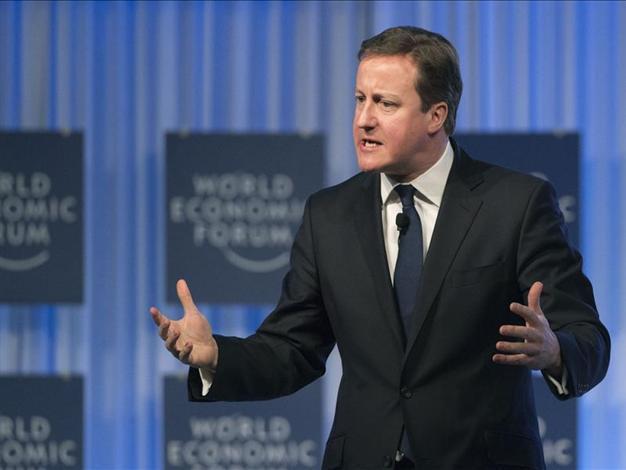At Davos, EU leaders urge Britain to stay in the club
DAVOS, Switzerland - Agence France-Press

British Prime Minister, David Cameron, gestures as he speaks to the assembly of the 43rd Annual Meeting of the World Economic Forum, WEF, in Davos, Switzerland, Thursday, Jan. 24, 2013. AP Photo/Michel Euler
The leaders of Ireland, Italy and The Netherlands Thursday urged Britain to stay in the European Union, following Prime Minister David Cameron's pledge to hold a referendum on EU membership.
Speaking on a top-level panel at the World Economic Forum in Davos, Dutch Prime Minister Mark Rutte warned that outside the 27-member bloc Britain would be "an island somewhere in the middle of the Atlantic Ocean, somewhere between the United States and Europe".
"It would not be connected with either of these two, so I think it's vital for us all that they stay in," added Rutte.
Cameron's promise to hold a public vote on whether Britain should remain part of the European Union has somewhat hijacked the agenda in Davos, previously expected to consider ways out of the three-year economic crisis.
Addressing the world's top business and political elite earlier, Cameron denied Britain planned to "turn our backs" on Europe and Irish Prime Minister Enda Kenny said the EU as a union would be more powerful with London still involved.
"The EU will continue to be stronger if Britain is part of it," he said on the same panel. "Whatever happens, I would like to see that Britain would remain central to the European Union. It's very important in the global sense." Kenny, whose country currently holds the EU's rotating presidency, also stressed that "five years is an eternity" in politics and urged Europe to use the relative calm on the financial markets to push forward reforms to bolster its economy.
Cameron pledged to hold the referendum by the end of 2017 if re-elected.
"What you need now is clarity," Kenny said, adding that Ireland had held referendums on several European issues in the past 40 years, with a "positive" response every time.
Italy's Prime Minister Mario Monti said he was confident the British people would choose to continue their tricky relationship with Brussels, because turning their back on the EU would mean losing several economic advantages.
"I believe that when the moment comes, the UK people will say 'yes' because... if they say 'no', they would have to get out of the single market," said Monti.
Whereas last year's meeting of the World Economic Forum was dominated by talk of Greece leaving the eurozone, the leaders agreed the bloc would now stay together, but Rutte surprised some by calling for an exit mechanism.
"I believe our aim should be to have the whole eurozone intact," said the prime minister.
"At the same time, you can never predict whether at one stage a country would want to leave the eurozone and I think it should be possible," he added.
And he clashed with Kenny on whether the EU needed to change its founding treaties to include some of the far-reaching reforms agreed during the three-year debt crisis that has pitched the eurozone into recession.
Rutte said that treaty change was necessary "in the medium-term" but Kenny stressed: "There is no opportunity now for re-opening negotiations about treaty changes." The Dutch prime minister also complained that too many tasks were being dealt with at a European level -- he cited the example of health and safety legislation -- and that it was difficult to bring powers back to home parliaments from Brussels.
"In terms of rules and legislation, it's a bit like 'Hotel California', you can check out but you can never leave," he said.
"You can never repatriate tasks to the national level."
